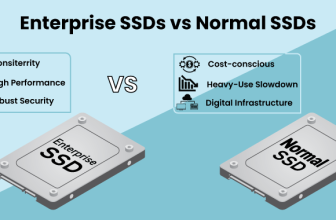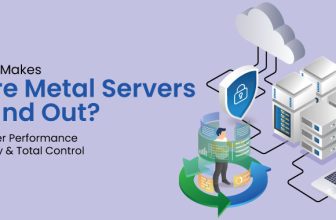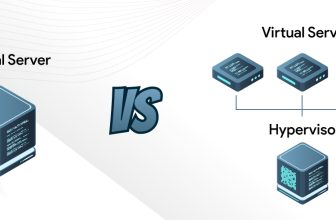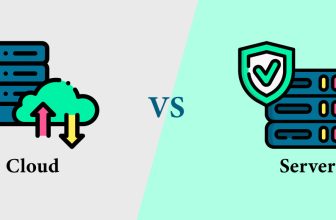When you set out to buy new servers for your business, comparisons between Dell and HPE will always be there. However, you need to assess your requirements first and gauge which brand serves your needs in the best possible way. Both these brands offer excellent options at competitive prices. Connect with your IT provider and do a logical assessment to select the brand that suits your company the best.
Dell Servers vs HP Servers Comparison
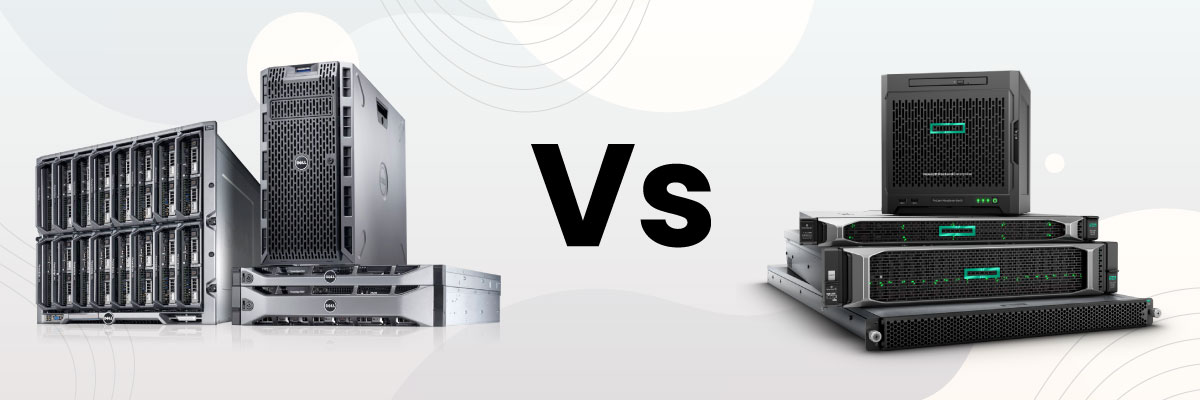
Dell and HP are among the most popular brands that make powerful, sturdy, and reliable servers. Both brands share almost the same popularity and offer similar features and benefits, with a few exceptions specific to each brand. People and businesses often compare the two to pick the right one for their requirements. The choices are mostly guided by personal experiences. We look at both brands here in terms of the features and benefits they offer.
Dell Servers
Dell EMC server portfolio includes their famous PowerEdge (PE) server product line. They have introduced diverse types of PE servers over the years. They offer a broad array of product and family codes under the PE brand name. All Dell servers within a generation come with consistent chipsets in spite of different packaging. This allows them to have common system images and a set of drivers for all servers.
Types Of Dell Server
Dell PE server systems come in three form factors:
Dell also offers Specialty servers, Industrial-Grade servers, and Management solutions.
After Dell introduced Gen 10 servers in 2007, they started using a uniform naming method for their servers. The name of every Dell server has a letter that means the type of server, R (rack), T (tower), and M (modular). The letter is followed by three digits, the first of which represents the number of sockets, the second digit indicates the generation, and the last one refers to the brand of the CPU.
Benefits
Apart from the standard benefits that all major brands of servers offer, the latest (12th Generation) Dell PE servers are built to provide an extra edge with the following advantages.
- They are designed for energy efficiency optimization.
- They streamline management with their innovative control and management tools and systems.
- They deliver enhanced compute power for increased application performance.
- They offer plentiful memory capacity to support demanding and complex workloads and virtualization.
Who Can Choose Dell Servers?
Dell servers bring together exhaustive industry-leading solutions designed to cater to all kinds of business needs for organizations of any size. Whether an individual, a small or medium company, or a large organization chooses Dell servers, it has many good reasons to do so.
- Wide Variety: If you are looking for an extensive selection of servers, Dell EMC provides a large array of server options to take on intensive workloads across industries and meet the needs of all sizes of businesses. They are available in all form factors, even hybrid ones, with variable socket options. Their modular servers allow you to customize further and combine different choices.
- Scalable Architecture: When you need servers that grow as your or your client’s businesses grow, Dell servers are the ideal choice as they offer maximum scalability. Their kinetic infrastructure enables altering of their assembly as the demands of workload change. This allows to free the underutilized components and use the utilized ones more efficiently.
- Automation: If you do not want your IT resources and their time to be tied up with the routine tasks related to your servers, Dell servers come with embedded intelligence, which enables automation of their whole lifecycle – from deployment to retirement. Their intelligent automation tools make server-based operations more productive and efficient.
- Security: If you want your data to never be compromised, choose Dell EMC servers; they are built to meet all your data protection requirements with integrated security. Each Dell server has a layer of defense built into its software and hardware. OpenManage, their single centralized management platform, enables control over multiple servers.
- Unrivaled Performance: You need high-performance Dell servers to deliver. They offer matchless capabilities such as up to 41% more transactions per second and 20.8x faster queries.
Scalability
Scalability is one of the top advantages that Dell servers offer. Most of their servers provide highly scalable storage, offering provision for up to 16 SAS drives having speed up to 12Gbps. Coupled with drives, the high-performance PowerEdge RAID Controllers (PERC) can speed up data access for your virtualized environments immensely. They offer variable memory capacities and multiple advanced processor options to fulfill your growing business needs. Their basic structure is such that it gives them the ability to allocate suitable resources for a specific workload and to change with dynamic changes in business environments.
Dependability
Dell servers are known to run for years without any breakdown or issues. Dell has always kept a watchful eye over the market trends and has consistently improved its servers with innovative technologies. Their most recent server lines are considered the most dependable in the market.
Processors Supported
Dell servers support multiple series and generations of different brands of Intel processors (Celeron, Pentium, Xeon, Xeon Scalable). They also support AMD Opteron and AMD EPYC processors. These advanced processors help Dell servers in delivering high performance and faster outcomes.
Raid Cards Supported
Redundant Array of Independent Disks (RAID), the data storage virtualization technology, brings together multiple physical drive components into a single unit for better performance and data redundancy. Dell servers use their own series of disk array controllers called PowerEdge RAID Controller (PERC), built for their PE servers. They come in series 5 to 11 families and support the different levels of RAID – RAID 0, RAID 1, RAID 5, RAID 10, RAID 50, and RAID 60, in both external and internal forms. PERC are enterprise-class controllers designed for fault tolerance, improved performance, better reliability, and easy management, giving the Dell servers a robust infrastructure and maximized uptime. They support SATA and SAS HDDs and SSDs.
OS
The Dell PE servers support multiple operating systems (OS) that include BIOS, Ubuntu, and different versions of the brands – Red Hat Enterprise Linux, VMware ESXi, Windows Server, Citrix XenServer, and SUSE Linux ES. They may not support a specific OS due to its non-availability with some products, compatibility issues, or if the software vendor has discontinued the support for it.
Storage
Dell PE servers offer multiple drive form options for a variety of storage capacities. Their different models can support up to 32 2.5″ SAS/SATA HDDs or SSDs to provide max internal storage of 122 TB. They offer provision for up to 18 3.5″ SAS/SATA SSDs or HDDs for max internal storage of 216 TB. They can also support up to 24 1.8″ SATA SSDs, up to 8 PCIe Gen 3 slots, up to 4 Express Flash PCIe SSDs, up to 10 NVMe drives, and up to 4 NVMe PCIe slots to provide different capacities for storage.
Memory
Dell PE servers use different types of memory DIMMS across their generations. Unbuffered DIMMs or UDIMMs do not buffer any of the add, control, clock, or data I/O lines. Registered DIMMs or RDIMMs, buffer add, control, and clock lines but do not buffer data I/O lines. Load reduced DIMMs or LRDIMMs were introduced in the 12th generation of PE servers. They buffer all – add, control, clock, and data I/O lines. NVDIMM-Ns are used for boosting storage platforms. Each NVDIMM-N can provide 16 GB of nonvolatile memory, and it comes in the same form factor as a normal 288-Pin DDR4 DIMM. DCPMMs support persistent high-performance solid-state memory. They have performance features similar to that of the TruDDR4 DIMMs. Dell servers support ECC DDR2, DDR3, and DDR4 memory with varying speeds and can provide a max RAM capacity of up to 12 TB.
For which applications are Dell servers suitable?
Dell PE servers provide high-level performance for a variety of workloads across industries. They support a broad range of applications and can enhance their performance effectively. The following applications can be used on Dell servers.
- Compute-intensive applications
- Cloud computing and HPC applications
- Data-Intensive applications
- Applications for service providers
- Applications and imaging for finance, science, and medical fields
- CRM and ERP applications
- Applications for virtualization
- Software-defined storage and technologies
- AI and ML applications
- GPU-based applications
- Datacenter technologies
HPE Servers
HPE is placed among the five leading server companies globally. It offers robust enterprise server solutions for all kinds and sizes of businesses. Their server portfolio offers a huge variety of products that come with advanced and high-speed technologies and can cater to the needs of all businesses. Among their server offerings, the ProLiant family is the most popular, selling a ProLiant server every few seconds.
Types
HPE servers are available in multiple types and form factors.
HPE ProLiant servers come in many different product lines based on their form factors, which are further divided into multiple series based on processor configuration.
- ML (Modular Line) has tower-based servers which are convertible to rack mount.
- DL (Density Line) consists of general-purpose rack-mount servers.
- BL (Blade Line) comprises blade servers within the HP BladeSystem.
- SL (Scalable Line) has rack-based models for data center environments.
- SY (Synergy Line) has Synergy Blades.
- MicroServer product line offers affordable entry-level servers for small and home businesses and edge computing.
Apollo line brings optimized density servers for scale-out and HPC environments.
HPE Integrity is a series of servers that are based on Itanium processors. This series has entry-level, mid-range, and high-end servers.
Benefits
The latest intelligent HPE ProLiant servers let you reimagine servers for your business in terms of computing. Whatever may be the size of your business, you will always find an HPE ProLiant server that is ideal for meeting your customer and business demands even while you have limited technology resources, money, and time. These servers provide a multitude of benefits.
- The ProLiant servers provide you with proper compute for specific workloads economically. They offer flexibility while supplying more storage capacity and compute.
- They use lower compute energy and floor space.
- They help you accelerate business outcomes with speedier memory, compute, and I/O performance.
- They deliver increased networking and storage performance, along with lower latency.
- These servers are built to handle a gamut of workloads, including web, analytics, IT infrastructure, collaboration, business applications, Big Data, and many more.
Who can choose HP servers?
HPE offers industry-leading and intelligent server solutions for workloads of all levels, whether small, midsize, or the most demanding ones. HPE’s stable, powerful, and high-performing servers are the choices for a majority of people for their personal use as well as all kinds of businesses.
- If you want to grow your business, HPE small business server solutions can be the best for the needs of your small and midsize business.
- You may be a small business with no on-premise IT experts or a growing medium organization with IT staff, HPE small business technology server systems are easy to own and manage and deliver the desired performance.
- If you plan to adopt virtualization technology to maximize your performance and scale at reasonable costs, HPE servers are for you.
- If you want to set up your own IT infrastructure for office deployment quickly, HPE servers offer affordable solutions.
- If you need business continuity with robust security, data storage and backups, and protection of your customers data, HPE servers will not let you down.
- If you want to enable virtual desktop infrastructure and remote desktop services for keeping your employees productive and connected, HPE has ideal solutions for you.
Scalability
Most of the server models falling under the ProLiant ML and DL lines, and the other high-end HPE servers offer versatile, flexible, and scalable designs to support numerous channels for increased processing. They can easily and quickly deploy your core workloads while providing uncompromising availability and scalability, allowing you to add capability and capacity to serve growing business requirements. You can add more or more powerful components and devices to boost the server-level performance for current needs and expansion for future hyperscale demands.
Dependability
HPE’s Apollo, Superdome, and the latest servers from the ProLiant line assure reliability. However, faults have been found within the HPE servers. During a survey done in the middle of the year 2017, it came to the fore that HPE ProLiant servers had about 2.5 times more downtime than the Dell PowerEdge servers. So, on the dependability front, Dell seems to be a winner. But HPE does an impressive job with their prognostic alerts about the parts that might fail. This gives the businesses a chance to repair or replace those parts before they break down completely and become the cause for downtime.
Processors Supported
The HPE ProLiant servers from Modular, Density, Scalable, and MicroServer lines support different generations and series of Intel Celeron, Intel Core, Intel Pentium, Intel Xeon, AMD Opteron, and AMD Turion processors. These power-packed processors help the servers achieve powerful processing.
Raid Cards Supported
HP was the first organization to introduce RAID subsystems in the network servers in 1989 (HP was Compaq then). In present times, RAID technology is considered a standard and is used for most of the network data storage online. HP offers its own range of Smart Array controllers that support RAID levels 0, 1, 1+0, 5, 6, 50, and 60. They have been providing SAS-based and PCIe 2.0-compliant Smart Array controllers since 2009. Some server models of their specific lines also offer embedded HP Smart Array technology. Both Gen 8 and the newer Smart Array generation by HP come with provisions for external, internal, and embedded controllers.
OS
HPE ProLiant servers support Microsoft, SUSE, Red Hat, Canonical, and Oracle OS. HPE also enables community Linux distributions. You can buy your complete operating environment from them. HPE also resells and provides full support and service for Microsoft Windows OS, SUSE Linux subscriptions, Red Hat Linux subscriptions, VMware, Microsoft Hyper-V, and Red Hat Enterprise Virtualization subscriptions.
Storage
HPE offers various options for storage disk drives in multiple form factors for their diverse ProLiant server product lines, providing a wide range of storage capacity. HP SmartDrives for Gen 8 servers include large form factor (LFF) SAS, LFF SATA, LFF SATA SSD, small form factor (SFF) SAS, SFF SATA, SFF SATA SSD, and SFF SAS SSD options. HP Hard Drive options include LFF SAS, LFF SATA, SFF SAS, and SFF SATA. SFF SAS SSD, SFF SATA SSD, and LFF SATA SSD come under the HP Solid State Drives. Their different combinations can provide maximum internal storage up to 54 TB.
Memory
HP ProLiant servers support DDR3 HP SmartMemory in five different types of DIMMs–RDIMMs, UDIMMs, LRDIMMs, HyperCloud (HDIMMs), and Ultra Low Voltage (ULVDIMMs). They come in different numbers, ranging from 2 to 128 slots across all server types, models, and series. And they can provide maximum internal storage starting from 8 GB up to 4 TB.
What Is The Main Difference Between HP And Dell?
Both Dell and HPE are very similar organizations that offer comparable features in their servers, nothing major stands out as a distinction. Which brand you choose for your business will depend on your needs. However, certain performance differences were established between the two in some areas. If you compare identical server units, Dell could complete a workload like TPC-H much quicker than its HP counterpart. HP fell behind Dell 20% low in efficiency on reading performance. If both are compared for variety, HPE fares better, it offers more simplified storage equipment and switches. It has a larger segment of equipment designed for small to mid-sized businesses.
HP Price Vs. Dell Price
When you compare the cost of initial investment for both brands, HPE is more flexible in price negotiation. If you have a good relationship with your vendor and frequently order large quantities, you can get good deals. Dell’s flexibility in this area is almost nil.
However, Dell equipment is used widely; it ships its hardware assembled and tested. This saves time and a bit of cost, but their deliveries may take up to two weeks. HPE ships its servers mostly unassembled and within one to two days, but you need to get it assembled and tested from your IT provider. That involves additional cost. So, the prices of both get balanced there.
IDRAC Vs. ILO
Both Dell and HPE have their own server management and monitoring technologies in place for easy maintenance of their servers, locally as well as remotely. Integrated Lights Out (iLO) is HPE’s Management tool, and Integrated Dell Remote Access Controller (iDRAC) is Dell EMC’s. Both the systems have developed over time and provide some similar features like HTML5 support. However, both are different too, in certain features.
- iDRAC has evolved for the better in its recent generations. Use of Java is no longer required after iDRAC 7, though its Graphic User Interface (GUI) is not as good as the new iLO GUI.
- For iDRAC, you need a physical license that you can buy in the secondary market. iLO standard version is included, but the advanced version requires a license. You cannot buy it from the secondary market. So, that locks you in with the OEM after your server’s end of life.
- With iDRAC, updates take a slightly longer time, and overall, it is a bit slower than iLO.



